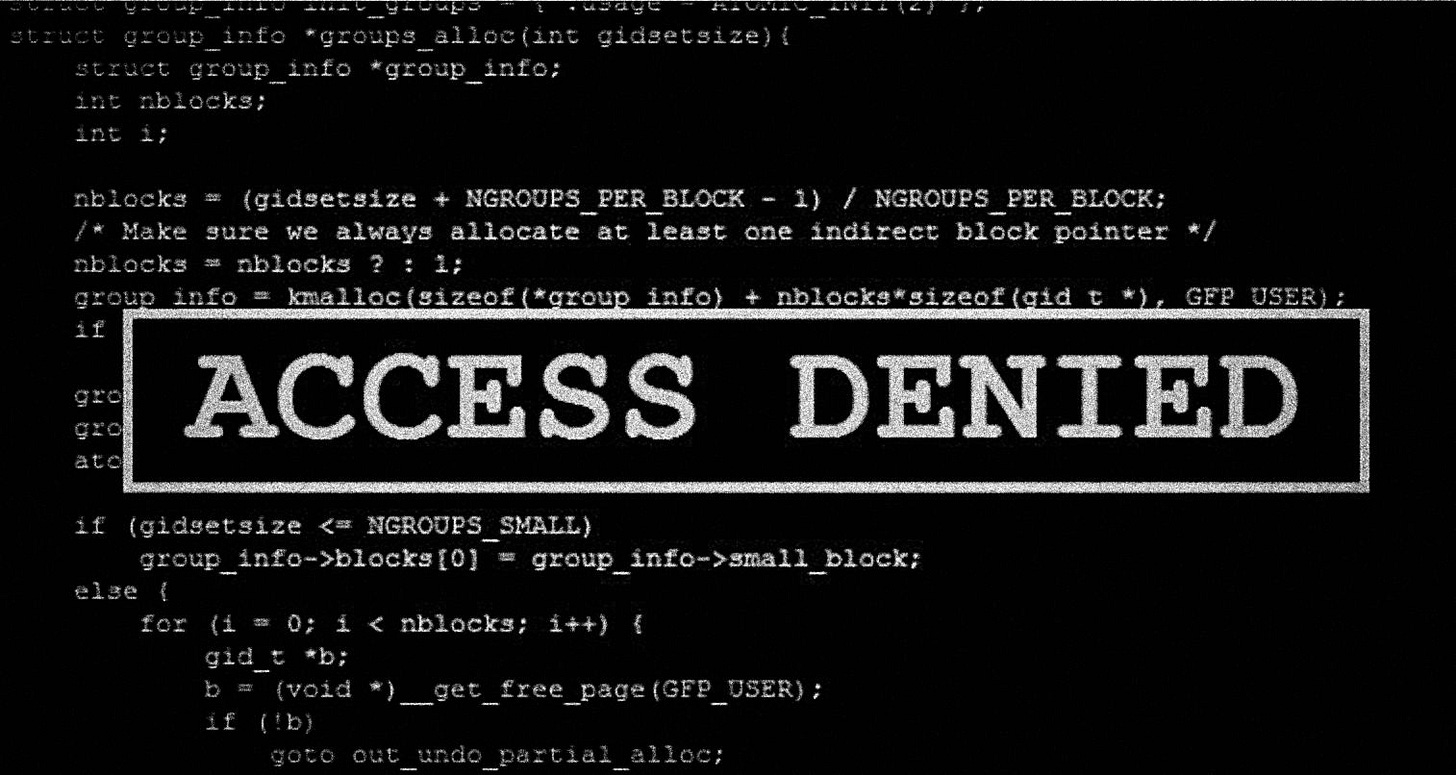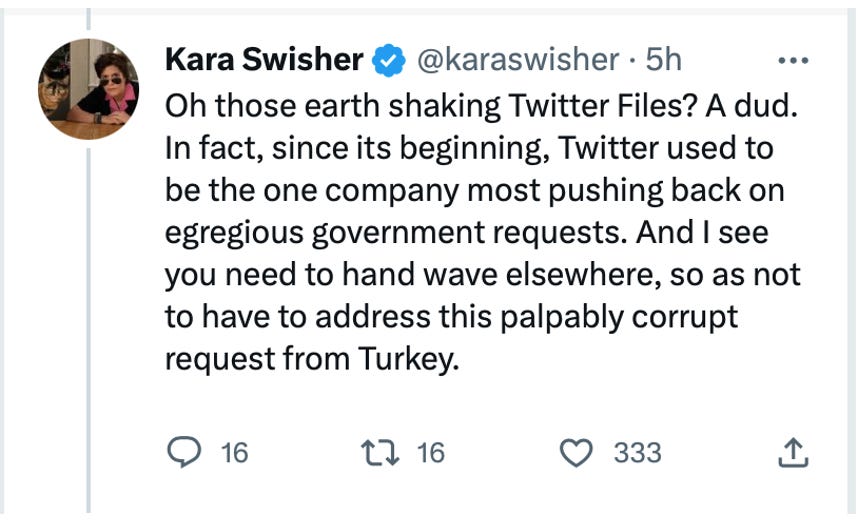TWITTER FILES: Internal Company Emails Expose Why Privileged Reporters Likely Hate Elon Musk and Twitter 2.0
Musk denied special access to Twitter’s “trusted reporters,” and allowed outside journalists entrée for a more independent examination
12 minute read
Shortly after Elon Musk purchased Twitter last October, his image plummeted among a certain set of tech and “disinformation” reporters. Feted months prior as Time Magazine’s 2021 person of the year, reporters pivoted after Musk bought the social media company and began promoting his alleged ties to Nazis, antisemitism, QAnon, Putin, Hitler, transphobia, and … well, you get the picture.
But what could have caused such whiplash among the journalist tribe?
During my trip to Twitter’s headquarters, I stumbled across several Twitter Files—internal company documents made public by CEO Musk—that shed light on this matter. For years, Twitter executives provided favored access to a pack of select technology and “disinformation” reporters, giving them insider entrée to new products, responding quickly to their reporting needs to identify and suspend “disinformation” accounts—even helping one Washington Post reporter shut down an account that delved into her background as a wealthy child of privilege who attacked conservatives. In another example, CNN reporters requested that Twitter alter their algorithm to create a “read only mode” to guard them from criticism.
By changing Twitter’s culture and firing the majority of employees, Musk severed these ties between Twitter executives and privileged journalists—relationships that were so close one executive referred to some journalists as “our reporters.” Reporters who were close to Twitter, returned the favor to company executives by giving them positive press—even helping the company deal with lawmakers by relaying drafts of pending bills and providing advice on product development.
“Our DC-based tech reporters have gotten advance copies of at least five draft House bills that may get introduced today or early next week that would make changes to federal law and give more power to regulators,” wrote one Twitter executive in a June 2021 email. “This is in line with what we’re hearing about the Biden administration’s priorities to address antitrust concerns.”
In a separate example, Twitter held a meet-and-greet with their “news partners” in New York City later that same year to “solidify key relationships, encourage intel sharing, and, more broadly, help to reinforce comm’s network of trusted reporters.” Reporting back on the meeting, Twitter’s Elisabeth Busby wrote that journalists were “excited to meet” and profiled each reporter’s needs and what Twitter might expect in return.
“Please keep this information close hold,” Busby emailed.
In her report, Busby provided detailed insight into Twitter’s relationship with multiple journalists—many who work in the “disinformation” space and who are now some of Elon Musk and Twitter’s greatest online critics
CNN’s Brian Stelter: “Willing to come to San Francisco, wherever to meet 1:1 with spokespeople, even for introductory conversations.”
CNN’s Oliver Darcy: “Would love to hear pitches from us.”
Vox’s Makena Kelly: “She’ll be reporting out of a deep red district—will mis- and disinformation message resonate?”
CNN’s Donie O’Sullivan: “Always interested in account enforcement, such as Rep. Marjorie Taylor Greene.”
NBC News Ben Collins: A self-described “disinformation reporter” Collins apparently praised Twitter for taking down what he described as “Qanon groups” faster than other social media companies and appreciated how Twitter helped him market himself and raised his public profile—“actually conducts other interviews (NPR, TV, etc.) due to his Tweets.”
Fox News producer for Dana Perino: “Is really eager to get us on the show sometime. We’ve done backgrounders with her [and] Dana would be fair and not any more tough than the nicest person to question us in Congress.”
Fox News’ Brook Singman: “I think we could have a good chance to influence this coverage….”
In a follow up email, another Twitter executive thanked Busby for profiling the journalists and reporting back on the meeting. “Especially helpful as we look ahead to 2022. Thanks for this.”
Musk’s $44 billion payment to buy Twitter shut down this club, leading to online acrimony and hate. Journalist tempers flared again when Musk opened up the company to allow reporters access to Twitter’s internal documents—something no other CEO has ever done before. But instead of inviting Twitter’s favored journalists at CNN, NBC News, the Washington Post, Fox News, Vox, and the New York Times, Musk offered this access to a new crew: Matt Taibbi, Bari Weiss, Michael Shellenberger, Lee Fang, David Zweig, Alex Berenson, and myself.
“It’s always the liberal journalists never the conservative journalists who work with Big Tech. Never!” said Chaya Raichik, who runs Libs of TikTok, a Twitter account that is regularly criticized by liberal media and has been the focus of several stories by the Washington Post’s Taylor Lorenz. “I never wanted to be political. It just happens that conservatives like me.”
No other company in modern history has offered up their internal communications to journalists—a group whose industry is shrinking fast in both numbers and public trust. For every working journalists today, 6.2 public affairs operatives work to shape the news, and over half of Americans now believe that news organizations try to mislead them.
By opening up Twitter’s documents to scrutiny, Musk ripped down the media theater’s backstage curtain, exposing company employees and journalists in off-stage canoodling, practicing their lines, before taking the stage to act out a self-promoting performance of public “truth telling.” While these practices may be well known in certain elite circles, they are rarely exposed to the public in such raw fashion.
They are nonetheless causing exasperation among liberal media types who have ignored Twitter Files showing that the federal government has worked to censor Americans by applying pressure on social media companies. Without any hint of irony, New York Times Magazine contributing editor Kara Swisher recently dismissed the Twitter Files as a “dud” while complaining that Musk acquiesced to censor in Turkey.
Here’s what I found in those Twitter Files that hints why so few journalists report fairly on Twitter today.
Keep reading with a 7-day free trial
Subscribe to The DisInformation Chronicle to keep reading this post and get 7 days of free access to the full post archives.





